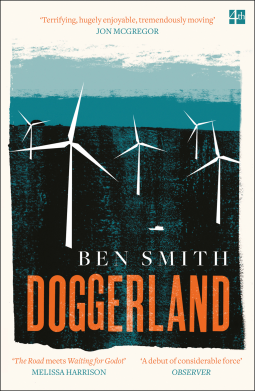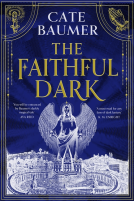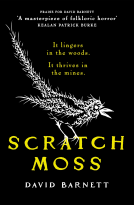
Doggerland
by Ben Smith
This title was previously available on NetGalley and is now archived.
Send NetGalley books directly to your Kindle or Kindle app
1
To read on a Kindle or Kindle app, please add kindle@netgalley.com as an approved email address to receive files in your Amazon account. Click here for step-by-step instructions.
2
Also find your Kindle email address within your Amazon account, and enter it here.
Pub Date 4 Apr 2019 | Archive Date 30 Sep 2019
HarperCollins UK, 4th Estate, William Collins | Fourth Estate
Description
Doggerland is brilliantly inventive, beautifully-crafted and superbly gripping debut novel about loneliness and hope, nature and survival – set on an off-shore windfarm in the not-so-distant future.
‘His father’s breath had been loud in the small room. It had smelled smoky, or maybe more like dust. He had knotted and unknotted a strap on the bag he was holding – he must have been leaving to go out to the farm that day. ‘I’ll get out,’ he’d said. ‘I’ll come back for you, ok?’ The boy remembered that; had always remembered it. And, for a time, he’d believed it too.’
In the North Sea, far from what remains of the coastline, a wind farm stretches for thousands of acres.
The Boy, who is no longer really a boy, and the Old Man, whose age is unguessable, are charged with its maintenance. They carry out their never-ending work, scoured by wind and salt, as the waves roll, dragging strange shoals of flotsam through the turbine fields. Land is only a memory.
So too is the Boy’s father, who worked on the turbines before him, and disappeared. The boy has been sent by the Company to take his place, but the question of where he went and why is one for which the Old Man will give no answer.
As his companion dredges the sea for lost things, the Boy sifts for the truth of his missing father. Until one day, from the limitless water, a plan for escape emerges…
This beautifully crafted novel about loneliness and hope, nature and survival, is as haunting as it is compelling – a very special debut indeed.
Advance Praise
‘In Doggerland, Ben Smith has created a vision of the future in which the world ends with neither a bang nor a whimper but just rusts gradually into the sea. I found it both terrifying and hugely enjoyable, as well as tremendously moving. Ben Smith's writing is incredibly precise; working with a restricted palette of steel greys and flaking blues, he paints the boundaried seascape with vivid detail. This is a story about men and fathers, the faint consolation of routine, and the undying hope of finding out what lies beyond the horizon. I absolutely loved it’ Jon McGregor, author of Reservoir 13
‘There’s a patience and rhythm deep in the prose – this is going to make a mark’ Cynan Jones, author of The Dig
‘Imagine, if you can, that Samuel Beckett, William Golding and J.G. Ballard got together to write a novel. It would be something like Doggerland – a melancholy yet riveting vision of isolation and endurance at the end of days. It heralds the arrival of a major talent’ Gregory Norminton, author of The Devil’s Highway
Available Editions
| EDITION | Ebook |
| ISBN | 9780008313388 |
| PRICE | £5.49 (GBP) |
| PAGES | 208 |
Average rating from 44 members
Featured Reviews
 Sue B, Reviewer
Sue B, Reviewer
I can’t better Jon McGregor’s contribution to the publisher’s blurb for this book and take the liberty of reproducing it here.
‘In Doggerland, Ben Smith has created a vision of the future in which the world ends with neither a bang nor a whimper but just rusts gradually into the sea. I found it both terrifying and hugely enjoyable, as well as tremendously moving. Ben Smith's writing is incredibly precise; working with a restricted palette of steel greys and flaking blues, he paints the boundaried seascape with vivid detail. This is a story about men and fathers, the faint consolation of routine, and the undying hope of finding out what lies beyond the horizon. I absolutely loved it.’ Jon McGregor, author of Reservoir 13
I also shy away from describing the plot. So little action takes place that to reveal any of it would be to spoil others’ experience of the book. The author’s outstanding creation for me is the atmosphere of the story - claustrophobic, despite its setting, and fraught with danger. There are only three characters and a degree of mystery surrounds all of them - how did they end up on the turbine farm?, what lives did they lead before? And, of course, central to it all, what lives could they live outside the farm?, what is out there beyond the last turbine?
The title Doggerland prompts more questions than it answers. I was aware of the area of dry land that used to connect Britain to Europe before it was flooded when the ice retreated and that now lies under the North Sea. I was aware that prehistoric artefacts have long been discovered off the British and Dutch coasts, and reading this story led to me spending a happy hour looking into it all online. I loved the way the author amalgamates these and other hints of ancient events into a futuristic novel about a world undergoing a slow but relentless apocalypse, and maybe renewal - really fascinating and thought-provoking.
Highly recommended.
 Wendy S, Reviewer
Wendy S, Reviewer
Sanity and resolve patiently weather the bleak and hostile location of a decaying oceanic platform, until monotony casts off and drifts beyond its dependable boundary.
Its occupants, a duo humbly labelled as ‘the boy’ and ‘the old man’, manage a forest of wind turbines surrounded by the endlessly churning ocean and a brooding confinement that ebbs and flows. Here, time erodes at a gruelling pace as they surrender to the predictability of one another’s company.
The chronic tedium of their routine keeps a steady course throughout and is carried along on alternating currents of futility and hope, while the narrative shifts between the past and present to reveal the prospect of a desperately punishing future.
This convincingly speculative read will see you brushing the salt off your clothes and guarding your heart against its lingering misery. Even when I’d reached the end I felt as though a little part of me was still clinging to the uninviting deck.
 Neil G, Reviewer
Neil G, Reviewer
My thanks to HarperCollins UK for an advanced copy via NetGalley of this debut novel from Ben Smith. On the publisher’s website, author Melissa Harrison describes Doggerland as “The Road meets Waiting for Godot: powerful, unforgettable, unique”.
The setting is the not-too-far-distant future on a vast offshore wind farm in the North Sea where two men (The Old Man and The Boy - they are named, but their names are rarely used) work as maintenance engineers. They are almost entirely alone and the boy is only there because his father, who previously worked there, disappeared mysteriously and The Company (whoever they may be) sent the boy to replace him. The relationship between the old man and the boy is a key element of the story as it develops. The old man scours the sea bed for lost things and talks repeatedly of how it all used to be dry land around them. The boy begins to search for evidence of his father. Suddenly, an opportunity for escape arises, but to say more would be to spoil the story.
Mixed in with the unfolding plot and character study, there are short chapters set in the past. These discuss how the land and sea have swapped places, how the sea is infinitely patient but wins the battles. These passages flow back in time and then come forward again, like the tide going in and out (or out and in, depending on which viewpoint you take).
The comparison with The Road comes from the setting which is the not-too-far-distant future when the sea has become a dead place and where our two protagonists live a lonely existence with only occasional visits from a supply ship. It is bleak, it is depressing:
“The cellophane creaked. The sun grated and the shiny surfaces grated but he didn’t move or get up. He’s stopped going outside. He’d stopped watching the water for things might drift past. He’d stopped searching for lights. He’d stopped going down to check on the boat. For a long time, all he’d done was stare out at the horizon - the long, uninterrupted line of it. The openness almost made him dizzy. There was nothing to draw the eye, nothing to catch hold of, just the clouds rushing past, and the currents sweeping. Everything moved away from him out there…”
And the comparison with Waiting for Godot comes from there being two men waiting and waiting while not very much happens. However, this is less true than the bleakness, because there is action and plot movement through this story. There is also humour in the writing. You can’t go wrong with a good old English pun which comes when discussing the “homebrew” that the old man concocts from all kinds of bizarre (and dangerous) ingredients:
“The boy had once found him prying the letters off one of the rig’s warning signs and scattering them into the vats. He said the brew need more character.”
A lot of the writing is poetic in nature. Smith imports a few words from other languages (I think that’s where they come from!) and is not, it seems, averse to making up some new words. “Gurrelly” may or may not be a typo, but whatever it is, it should stay in the book as it is a magnificent word! In the first few chapters, I kept highlighting passages and making a note that said “cinematic”: Smith’s writing draws vivid images in your mind and it is hard not to see some passages as clips from a movie. For example, try to read this without imagining a camera pulling away from the boy to expose the vastness of the sea around him:
“The boy tied off the line, straightened his back and blew lightly on his palms. ‘Good catch,’ he said.
Beside him, the thick steel support rose twenty metres to the rig. Above the rig’s squat rectangular housing, the blades of the nearest turbine turned slowly in the washed-out sky. All around, to every horizon, the blades of the wind farm turned.”
As the publisher’s website says, “Doggerland is a haunting and beautifully compelling story of loneliness and hope, nature and survival.” It’s a compelling read.
 Ciaran S, Reviewer
Ciaran S, Reviewer
Doggerland is a remarkable debut novel, creating a claustrophobic sense of growing danger against the backdrop of a wind farm seascape that the two main characters are effectively trapped within. The novel dwells on the minutiae of keeping a wind farm operational with limited supplies, slowly developing the back story of the global and personal circumstances that have led to this position. The sea and wind themselves are the other main character, being the drivers behind short term activity and long term outcomes.
i recognise this doesn’t necessarily sound very thrilling (i’m a terrible spoiler-phobe), but be reassured that Doggerland skilfully builds tension from both circumstance and the interpersonal dynamic.
 Joseph C, Reviewer
Joseph C, Reviewer
Doggerland is the name given in the 1990s to an area of land, now submerged beneath the North Sea, which connected Great Britain to Continental Europe. Doggerland once extended to modern-day Denmark and far north to the Faroe Islands. It was a grassland roamed by mammoth, lion, red deer – and their human hunters – but melting ice turned it into an area of marshes and wetlands before it was finally and definitively claimed by the waves around 8,000 years ago. (Incidentally, Doggerland was recently in the news following exciting archaeological discoveries).
The idea of a submerged world resonates with mythical and poetic associations and, as a result, “Doggerland” lends itself well as the title of Ben Smith’s debut novel. The work, in fact, portrays an unspecified but seemingly not-so-distant future, where global warming and rising sea levels (possibly exacerbated by some other cataclysm) have eroded the coastline and brought to an end civilisation as we know it.
This strange, new world is made stranger still by the purposely constrained stage against which the narrative plays out. Smith focuses on two main characters, maintenance men on an enormous wind farm out in the North Sea, who lead a solitary existence on a decrepit rig amongst the rusting turbines. Although we are given their names, they are generally referred to in the novel as “the Boy” and “the Old Man”. Early on in the book, we are told that of course, the boy was not really a boy, any more than the old man was all that old; but the names are relative, and out of the grey, some kind of distinction was necessary. It’s a significant observation, because much of the novel’s undeniable power derives from a skilful use of a deliberately limited palette. The men’s life is marked by a sense of claustrophobia, the burden of an inescapable fate. The monotony of the routine is only broken by occasional visits of the Supply Boat and its talkative “Pilot”, who is the only link with what remains of the ‘mainland’. The struggle to keep the turbines working with limited resources becomes an image of the losing battle against the rising oceans, at once awesome and terrible in their vastness. The Romantic notion of the Sublime is given an environmentalist twist. One can smell the rust and smell the sea-salt.
Whilst the reader is made to share the ennui of the Boy and his mentor, Smith turns his story into a gripping one by making the most of the scant plot elements. For instance, we are told that the Boy was sent on the rig to replace his father, after the latter’s unsuccessful escape attempt. What exactly happened remains unclear but, together with the Boy, we glean some disturbing details along the way – in this regard, Smith takes a page out of dystopian post-apocalyptic fiction, and suggests that society has been taken over by some sort of totalitarian regime of whom the Boy’s father was, presumably, a victim. Part of the pleasure in reading this novel comes from trying to piece together an understanding of what exactly is happening on the mainland, considering that the perspective given to us is that of two people stranded in the middle of nowhere.
At times, Doggerland reminded me of Megan Hunter’s The End We Start From, which also describes a future marked by rising water levels. However, whereas Hunter’s vision, with its images of creation, birth and maternity, is ultimately a hopeful one, Smith’s is devoid of any feminine figure, suggesting a sterility in the human condition which can only lead to its annihilation. Doggerland is haunting in its bleakness:
The wind blows, the branches creak and turn. Somewhere in the metal forest, a tree slumps, groans but does not quite fall. The landscape holds fast, for a moment. For how long? It may be centuries. Barely worth mentioning in the lifetime of water...
https://endsoftheword.blogspot.com/2018/11/become-ocean-ben-smiths-doggerland.html


















